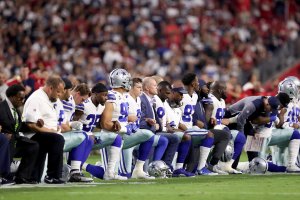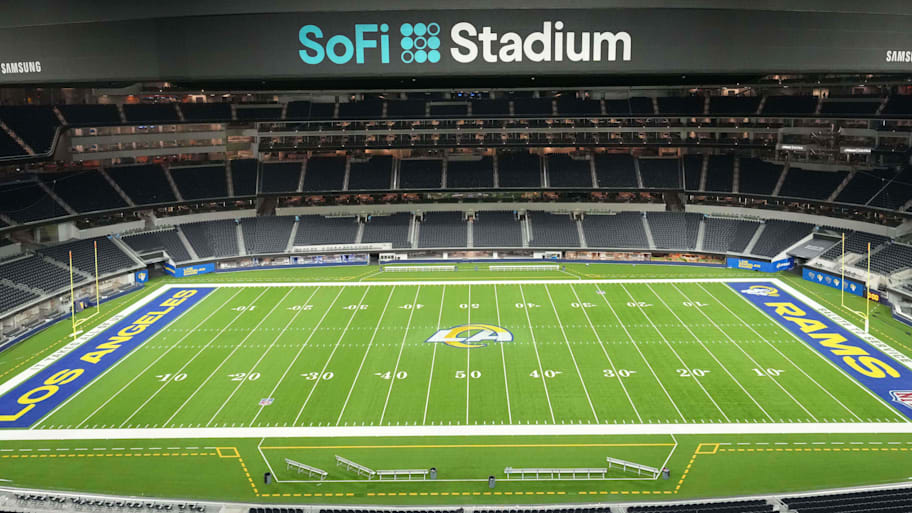The Dallas Cowboys and Arizona Cardinals on Monday night locked arms with teammates in response to President Donald Trump’s caustic comments. But it was the scripture reference on the hand of the woman belting out the National Anthem that resonated with many.

The scripture, written on the hand of pop star Jordin Sparks, is Proverbs 31: 8-9: “Speak up for those who cannot speak for themselves, for the rights of all who are destitute. Speak up and judge fairly; defend the rights of the poor and needy.” Many took to social media to praise Sparks.
The Cowboys’ and Cardinals’ display came after a weekend in which Trump slammed the National Football League, and players and coaches for protesting during the anthem. The players responded Sunday by kneeling, locking elbows or remaining in the locker room during the pregame performance of “The Star-Spangled Banner.”
Members of the Cowboys and Cardinals stood in separate locations for the anthem. The teams had talked about a collective display of unity but did not do so, said ESPN sideline reporter Lisa Salters. No member of either team was shown in the televised broadcast kneeling or sitting.
Before Sparks’ rendition, the Cowboys, including owner Jerry Jones, knelt in the middle of the field. Boos could be heard from the crowd in Glendale, Arizona.
The players’ demonstration was intended as a statement for equality and a representation of unity, but they wanted to separate that message from the National Anthem, according to Salters, who spoke with Jones’ daughter, Charlotte Jones Anderson, the team’s executive vice president.
As the Cardinals players, coaches and owners gathered in the end zone to honor the flag and members of the armed forces, public address announcer Jim Barnett invited the crowd to “unite as well and do the same with our fellow fans.”
‘An individual right of an American’
Earlier, Cardinals head coach Bruce Arians said it’s up to players to decide whether to stand or kneel during the anthem. “That is an individual right of an American,” he said.
Earlier, Cowboys coach Jason Garrett was reticent at best when questioned by reporters.
“We have an approach that we believe in, and no real comment beyond that,” he said.
They kept grilling him. Will the players do anything? Has there been a discussion?
“No,” Garrett said, drawing an awkward silence as reporters waited for him to elaborate. He didn’t.
Another journalist asked: Did Garrett not have an opinion on the protests, or was he simply reluctant to share it?
“I just don’t think it’s in anyone’s best interests for me to comment on that,” he said.
With that, the press conference moved on to football matters. It’s worth noting though that the man who signs Garrett’s paychecks has been vocal about the anthem protests.
Last year, when then-San Francisco 49ers quarterback Colin Kaepernick saw only a modicum of support for the anthem protests he’s pioneered, Cowboys owner Jones told a Fort Worth radio station that such demonstrations were “really disappointing.”
Jones reiterated those sentiments last week, telling Fox Business that the pregame National Anthem wasn’t the time for players to express themselves in society.
“That’s not the place to do anything other than honor the flag and everybody that’s given up a little for it,” he said.
‘Most reputable men I’ve ever met’
Cowboys players, in their public statements, have largely trod the middle ground on the issue, while at least two Cardinals declined to rule out the possibility of protesting.
Arians has said he concurs with NFL Commissioner Roger Goodell, who called Trump’s remarks divisive and said they demonstrate “an unfortunate lack of respect for the NFL” and its players.
“I’ve been in locker rooms for 25 years, and some of the most reputable men I’ve ever met wear that uniform,” Arians said. “To even overcome the things in their life to get to the NFL is amazing. What they’ve done in the last month for hurricane relief victims speaks volumes of what we’re all about in the NFL.”
Offensive lineman D.J. Humphries was less diplomatic, declining to call Trump by his name.
“You can’t talk to that person,” he said. “You’re talking to a wall. You may as well talk to my locker because you’re going to get the same response … I hate that this happened. I’m just trying to figure a way that I can help my people, and help the people on this side of the spectrum understand right and wrong.”
Humphries echoed the words of defensive end Frostee Rucker, who said now is the time to come together and “show compassion, love and everything else we do.”
“It’s a brotherhood in the locker room. We’re out in the community, and we know ourselves. We know everything we’re about. We can’t let one single person, even though it’s the President, dictate how we feel. We stick together. We’re in a union. If someone takes a knee, it’s almost like we all take a knee.”
Trump: Players should not ‘disrespect’ flag
The latest chapter in the controversy came Friday night when Trump told those attending a political rally in Alabama that NFL owners should fire any “son of a bitch” who stages a protest during the National Anthem.
The President’s focus remained on sports Saturday morning, as he tweeted he was rescinding a White House invitation for the NBA champion Golden State Warriors because two-time league MVP Steph Curry was “hesitating” in accepting the presidential offer. (Curry actually had flat-out declined the invitation.)
Hours later, the President went back in on athletes following in the knee prints of Kaepernick, who has said he refuses to stand during the anthem because he cannot “show pride in a flag for a country that oppresses black people and people of color.”
Read Trump’s two-part tweet: “If a player wants the privilege of making millions of dollars in the NFL, or other leagues, he or she should not be allowed to disrespect our Great American Flag (or Country) and should stand for the National Anthem. If not, YOU’RE FIRED. Find something else to do!”
Trump went on to make the protests his cause du jour — or more accurately, de deux jours — as 15 of his next 23 tweets over the weekend addressed the demonstrations.
His stance gained traction among his base and some NFL fans, who took to social media to tell athletes to stick to sports and skip the politics. Others used hashtags such #standforouranthem and #standfortheflag, tweeting that they were going to follow Trump’s advice to tune out.
‘That offends everybody’
Within the NFL there was a starkly different response, which was also reflected on social media and in some fan bases. Trump’s criticism seemed to galvanize the league’s players and coaches.
In some cases, team owners showed up on the sideline to lock arms with their players. Trump supporter Shad Khan, who owns the Jacksonville Jaguars, was one of them. Trump friend Robert Kraft stood in the owners box, hand over heart, before his New England Patriots played, but he said he was “deeply disappointed” in Trump’s remarks.
New Orleans Saints quarterback Drew Brees called Trump’s remarks “unbecoming of the office of the President,” while Buffalo Bills running back LeSean McCoy said the President “is just acting like a jerk.”
Miami Dolphins safety Mike Thomas asked, “You’re the leader of the free world, and this is what you’re talking about?”
The Seattle Seahawks and Tennessee Titans followed the Steelers’ lead, staying in the locker room for the anthem. Most teams chose to lock arms in a show of unity, but even among those squads, some players opted to kneel. The Baltimore Ravens’ Terrell Suggs and the Denver Broncos’ Von Miller lent their considerable star power to the protests, kneeling along with dozens of others players.
Sports commentator Bob Costas told CNN on Monday the response among players and coaches was “universal” and said, “There’s almost no one in the NFL who wants to support or rationalize the tone or content of President Trump’s remarks.”
Asked why he felt Trump’s words united the league when the protests have been going on for more than a year, Costas compared the President’s remarks on the anthem protests to his words after white nationalists marched in Charlottesville, Virginia.
“Well, when you call people sons of bitches across the board, that offends everybody. White and black, they’ve stood shoulder to shoulder on those fields, in those locker rooms. What kind of a statement is that to make?” Costas said.
“And I don’t think it’s irrelevant that clearly the President had more passion and conviction for those remarks than he did — when he finally got around after equivocating — to distancing himself to some extent from white nationalists and neo-Nazis. He clearly had more fervor for this than for that.”





























